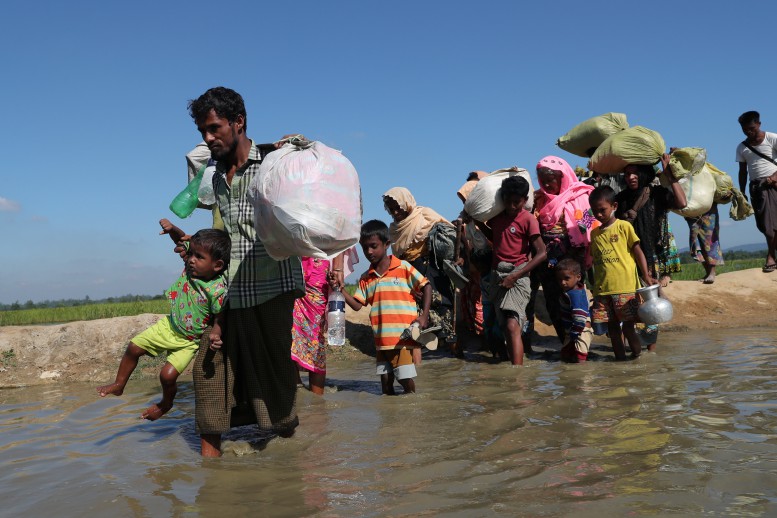Human rights groups called on Friday for international agencies to be allowed to monitor the planned repatriation of hundreds of thousands Rohingya Muslim from Bangladesh to the homes they fled in Burma during the past three months.
The two governments signed a pact on Thursday settling terms for the repatriation process. They aim to start the return of Rohingya in two months in order to reduce pressures in the sprawling refugee camps that have mushroomed in the Cox’s Bazaar region of Bangladesh.
“The idea that Burma will now welcome them back to their smoldering villages with open arms is laughable,” said Bill Frelick, refugee rights director at Human Rights Watch, using the former name for Myanmar.
“Instead of signing on to a public relations stunt, the international community should make it clear that there can be no returns without international monitors to ensure security, an end to the idea of putting returnees in camps, the return of land and the rebuilding of destroyed homes and villages.”
More than 600,000 Rohingya sought sanctuary in Bangladesh after Burma’s military launched a brutal counter insurgency in their villages across northern parts of Rakhine State following attacks by Rohingya militants on an army base and police posts on 25 August.
The United Nations and United States have described the military’s actions as “ethnic cleansing”, and rights groups have accused security forces of atrocities, including mass rape, arson and killings.
While Burma’s civilian leader Aung San Suu Kyi has said repatriation of the largely stateless Muslim minority would be based on residency and would be “safe and voluntary”, there were concerns that the country’s autonomous military could prove obstructive.
The memorandum of understanding signed by Burma and Bangladesh on Thursday said a joint working group would be set up within three weeks to prepare the way for the Rohingyas’ return.
But it gave scant details about the criteria of return and of what role, if any, the United Nations refugee agency, UNHCR, could play.
“It is standard practice in voluntary repatriation operations that UNHCR would be involved to ensure international standards are met for any type of return agreement,” said UNHCR spokesman Andrej Mahecic. “We haven’t seen the paper.”
Right watchers said other important points that were not addressed in the statements released separately by the two governments included the protection of Rohingya against further violence, a path to resolving their legal status and whether they would be allowed to return to their own homes.
Suu Kyi’s spokesman was not immediately available for comment on Friday, and had declined to comment on these concerns when contacted by Reuters late on Thursday.
Charmain Mohamed, Amnesty International’s director for refugee and migrant rights, said the UN and international community “have been completely sidelined” and the talk of return is “premature” while the flow of Rohingya refugees to Bangladesh continues.
Driven out of Burma predominantly by chaos, starvation and fear, hundreds continue to pour daily into Bangladesh, humanitarian workers say. While the violence has mostly ceased, Rohingya say they have largely lost access to sources of livelihood such as their farms, fisheries and markets.
[related]
“We will go back if they don’t harass us and if we can live life like the Buddhists and other ethnic groups. Our educated children should get government jobs like the others,” said Sayer Hussein, 55, who arrived in Bangladesh two months ago.
Thousands of Rohingya, mainly old people, women and children, are still stranded on beaches, waiting for a boat to take them to Bangladesh.
Some independent estimates suggest there could still be a few hundred thousand Rohingya in Rakhine.



